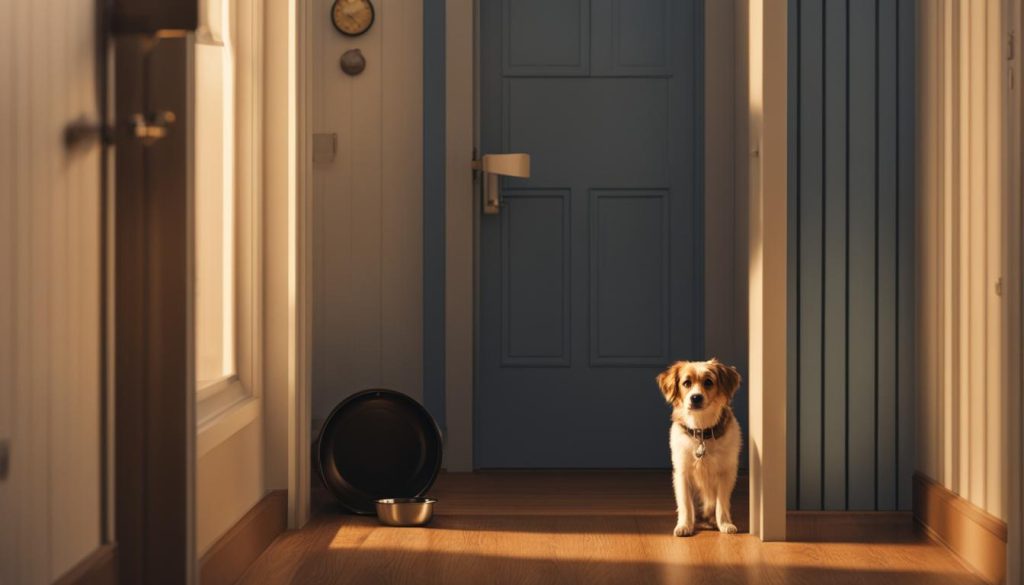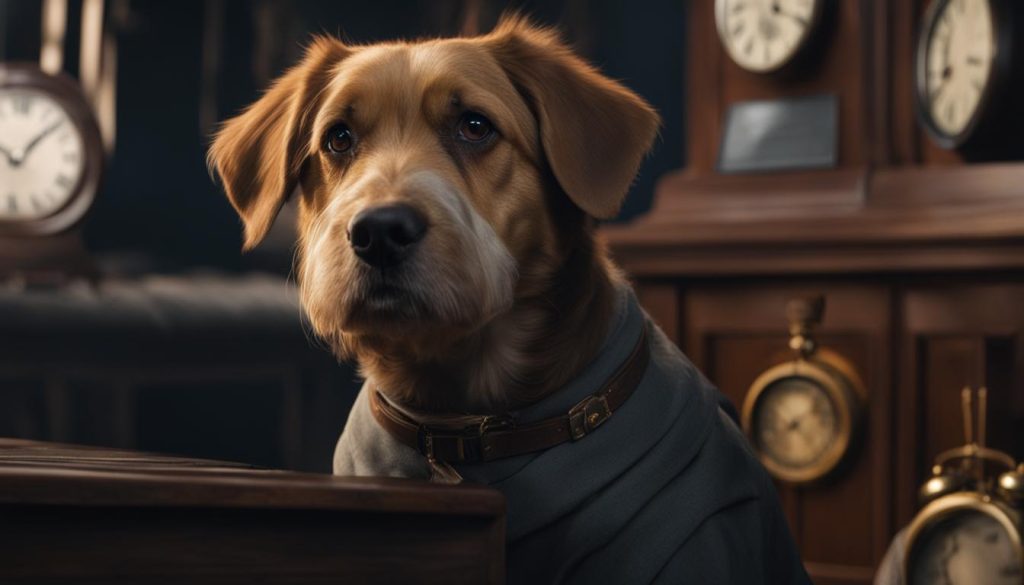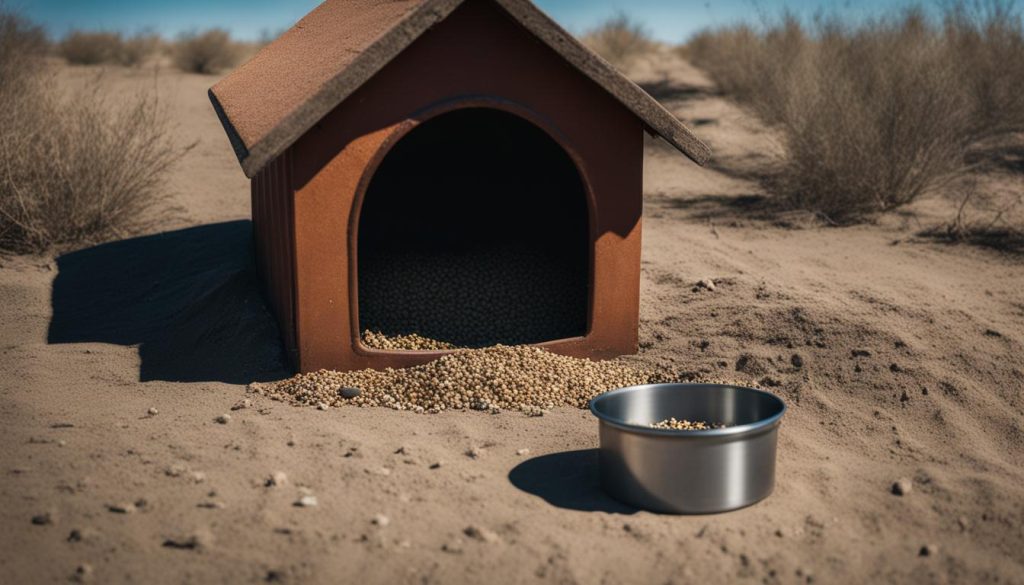As a dog owner, understanding how long dogs can hold their poop is essential for their health and well-being. Every puppy is different, and various factors influence their bathroom habits. From the duration between bathroom breaks to the capacity for holding poop, several elements come into play.
Key Takeaways:
- The average holding time for puppies is about three hours.
- Small dogs and puppies can hold it up to four hours, while larger dogs and growing dogs can hold it up to eight hours.
- Factors like size, age, diet, exercise level, stress, and health issues can affect a dog’s poop holding capacity.
- Establishing a routine and providing regular opportunities for elimination are crucial for puppies to develop good bathroom habits.
- Holding in poop for extended periods can potentially lead to health issues in dogs, but it is unlikely to make them sick unless they have underlying conditions like constipation.
Factors Affecting How Long Dogs Can Hold Their Poop

Several factors can influence how long a dog can hold its poop. These factors include the size and age of the dog, its diet, the number of times it is fed, its exercise level, stress level, sleep patterns, health issues, breed-specific differences, and the length of its gastrointestinal (GI) tract.
The size and age of a dog play a role in determining its poop holding capacity. Generally, larger dogs tend to have a longer transit time through their GI tracts compared to smaller dogs. The type of diet and the number of times a dog is fed can also impact how long it can hold its poop. Additionally, the level of exercise, stress, and sleep can affect a dog’s ability to hold its poop. Health issues can either increase or decrease the time a dog can hold its poop, and breed-specific differences may also play a role with some breeds having shorter intestinal lengths and higher fecal retention times compared to others.
Understanding these factors can help dog owners establish routines and provide the necessary opportunities for their dogs to relieve themselves in a timely manner, promoting their overall well-being and preventing any potential discomfort or health issues that may arise from holding in poop for too long.
How Long Can Puppies Hold Their Poop?
Puppies have a limited ability to hold their poop compared to adult dogs. On average, puppies can hold their poop for about three hours. However, this can vary depending on factors such as size, age, and training. Generally, smaller puppies may have a shorter poop holding capacity, whereas larger puppies may be able to hold it for a bit longer.
To help puppies develop good bathroom habits, it’s important to establish a routine and take them out to poop after certain activities like eating, sleeping, playing, and drinking. By consistently reinforcing these bathroom breaks, you can help puppies understand when and where they should relieve themselves.
Crate training can also be beneficial in preventing accidents indoors. By providing a safe and confined space for your puppy, you can encourage them to hold their poop until they are taken outside. Gradually increasing the time spent in the crate can help puppies build up their poop holding capacity.
| Factors | Effect on Puppy Poop Holding Capacity |
|---|---|
| Size | Smaller puppies may have a shorter poop holding capacity compared to larger puppies. |
| Age | Younger puppies may have a shorter poop holding capacity compared to older puppies. |
| Training | Puppies who have been consistently trained to go outside for bathroom breaks may have a better understanding of when and where to relieve themselves. |
In summary, puppies can generally hold their poop for about three hours. The size, age, and training of the puppy can affect their poop holding capacity. Establishing a routine, crate training, and consistent potty training can help puppies develop good bathroom habits. By providing the necessary opportunities and guidance, you can help your puppy learn to hold their poop and go in the appropriate place.
How long can adult dogs hold their poop?
When it comes to adult dogs, the average duration they can hold their poop is around 8 hours. However, dogs may not wait this long and may prefer to relieve themselves sooner to avoid discomfort. The frequency of bowel movements can vary depending on factors such as diet, exercise level, and overall health. It is crucial to provide regular opportunities for adult dogs to eliminate waste and not leave them alone for longer than 4 to 6 hours to ensure their well-being.
To better understand the pooping habits of adult dogs, it is useful to consider their poop holding capacity. This can be influenced by various factors, including size, age, diet, and health. Smaller dogs typically have a faster transit time through their gastrointestinal tracts, meaning they may need to poop more frequently compared to larger breeds. Additionally, a dog’s diet, including the type of food and the number of times they are fed, can affect their poop holding capacity.
The frequency of a dog’s bowel movements can also be influenced by their overall health. Dogs with certain health conditions or medications may experience changes in their poop holding capacity and frequency. It is important to observe any changes in their bathroom habits and consult a veterinarian if there are any concerns.
| Factors | Impact on Poop Holding Capacity |
|---|---|
| Size | Smaller dogs may need to poop more frequently. |
| Age | Younger dogs may have a shorter poop holding capacity. |
| Diet | The type of food and feeding schedule can affect poop holding capacity. |
| Health | Underlying health issues can impact poop holding capacity and frequency. |
Ensuring that adult dogs have regular opportunities to eliminate waste is essential for their overall health and well-being. It is important for dog owners to be aware of their dog’s individual needs and adjust their routine accordingly to promote healthy and consistent bowel movements.
How long can older and sick dogs hold their poop?

As dogs age or experience health issues, their ability to hold their poop for long periods of time may be reduced. It is important to understand the bowel movement duration for older and sick dogs to ensure their comfort and well-being.
Elderly dogs, similar to puppies, may need more frequent bathroom breaks. The bowel movement duration for older dogs can vary depending on their individual health and age. While some may still be able to hold their poop for a few hours, others may need to relieve themselves more frequently. It is crucial to observe your older dog’s bowel habits and consult with a veterinarian if you notice any changes or concerns. Providing them with regular opportunities to eliminate waste is essential for their overall health.
Sick dogs, whether recovering from an illness or undergoing treatment, may also have a shorter bowel movement duration. Medications, changes in diet, and stress can affect their digestive system, resulting in more frequent bathroom breaks. It is important to monitor their bowel habits closely during this time and communicate any changes or concerns with your veterinarian. They can provide guidance on managing their bowel movements and ensuring their comfort.
Remember, older dogs and sick dogs have unique needs, and their bowel movement duration may differ from that of healthy adult dogs. By monitoring their habits and seeking veterinary advice when needed, you can help maintain their digestive health and overall well-being.
How long can puppies hold their poop after eating?

Puppies typically have a bowel movement within a few hours after eating. The exact time may vary depending on factors such as the size, age, and activity level of the puppy. It is important for puppy owners to establish a routine and take their puppies out to poop after meals to prevent accidents indoors. Crate training and immediate potty breaks after eating can help encourage good bathroom habits in puppies.
It is worth noting that every puppy is different, and some puppies may have to go sooner or later after eating. As puppies grow, their digestive systems develop, and their poop holding capacity may increase. It is essential for puppy owners to be patient and consistent with potty training, providing ample opportunities for their puppies to relieve themselves after meals.
Table: Puppy Poop Holding Time After Eating
| Puppy Age | Typical Poop Holding Time After Eating |
|---|---|
| 8-12 weeks | 1-2 hours |
| 3-6 months | 2-3 hours |
| 6-12 months | 3-4 hours |
Puppy owners should keep in mind that accidents may happen during the potty training process, and it is important to be patient and consistent. With time and proper training, puppies can develop good bathroom habits and hold their poop for longer periods after eating.
Can holding in poop make a dog sick?
When it comes to holding in poop, there may be potential health risks for dogs. While it is unlikely for a dog to hold in poop long enough to make themselves sick, there are certain circumstances where it can lead to discomfort and even health problems.
“Holding in poop for extended periods can potentially lead to fecal bacteria overload, causing abdominal pain and discomfort.”
One of the main concerns of holding in poop is the reabsorption of fecal bacteria into the body. If poop is not eliminated, the bacteria can build up, leading to abdominal pain and discomfort. However, most dogs have a natural urge to relieve themselves and will not hold it in for excessive periods of time.
It is important to note that if a dog is consistently holding in poop, it may be a sign of an underlying medical condition, such as constipation. In such cases, it is recommended to consult a veterinarian for proper diagnosis and treatment.
Health risks of holding in poop:
- Fecal bacteria overload
- Abdominal pain and discomfort
- Possible constipation
- Underlying medical conditions
| Health Risk | Description |
|---|---|
| Fecal bacteria overload | If poop is held in, the fecal bacteria can reabsorb into the body, potentially causing an overload and leading to abdominal discomfort. |
| Abdominal pain and discomfort | Holding in poop for extended periods can result in abdominal pain and discomfort for the dog. |
| Possible constipation | Consistently holding in poop can lead to constipation, which can further exacerbate the discomfort and increase the risk of health problems. |
| Underlying medical conditions | If a dog is consistently holding in poop, it may indicate an underlying medical condition that requires veterinary attention. |
While it is important to encourage regular and timely elimination for dogs, occasional instances of holding in poop are not typically cause for concern. However, if a dog consistently shows signs of holding in poop or experiences any related health issues, it is best to consult with a veterinarian for proper evaluation and guidance.
What to do if your dog hasn’t pooped in 24 hours?

If your dog hasn’t pooped in 24 hours, it could be a sign of constipation and should not be ignored. Constipation in dogs can be uncomfortable and even painful, so it’s important to take action to help your furry friend find relief. Here are some steps you can take:
- Monitor your dog’s behavior: Watch for signs of discomfort, such as straining to poop, whimpering, or lack of appetite. These can indicate constipation and the need for intervention.
- Increase water intake: Make sure your dog has access to fresh water at all times. Adequate hydration can help soften the stool and make it easier for your dog to pass it.
- Add fiber to their diet: Consult with your veterinarian about adding fiber to your dog’s diet. This can be in the form of canned pumpkin, psyllium husk, or certain high-fiber dog food options. Fiber helps to add bulk to the stool and stimulate bowel movements.
- Exercise: Physical activity can help stimulate the digestive system and promote healthy bowel movements. Take your dog for regular walks or play sessions to keep their system moving.
- Consult a veterinarian: If your dog’s constipation persists or worsens, it’s essential to seek veterinary advice. They can provide a proper diagnosis and recommend suitable treatments or medications to relieve constipation.
“If your dog hasn’t pooped in 24 hours, it could be a sign of constipation and should not be ignored.”
Remember, every dog is different, and what works for one may not work for another. It’s essential to consult with a veterinarian who can provide personalized guidance based on your dog’s specific needs and health conditions. Prompt intervention and appropriate treatment can help alleviate constipation and ensure your dog’s well-being.
| Symptoms of Constipation in Dogs | Causes of Constipation in Dogs |
|---|---|
|
|
Preventing Constipation in Dogs
To prevent constipation in dogs, it’s important to establish healthy habits and provide a well-balanced diet. Here are some tips:
- Ensure your dog has access to fresh water at all times.
- Feed your dog a high-quality diet that contains adequate fiber.
- Include moderate exercise in your dog’s routine to promote regular bowel movements.
- Avoid giving your dog bones or other hard-to-digest items that could cause blockages.
- Stay up-to-date with your dog’s veterinary check-ups to address any potential health issues early on.
By following these preventive measures and seeking veterinary care when necessary, you can help keep your dog’s digestive system healthy and prevent constipation.
How Many Times Should a Dog Poop a Day?

Determining the normal frequency of a dog’s bowel movements is essential for monitoring their overall health. While the exact number of times a dog should poop each day can vary depending on factors such as their age, size, diet, and individual metabolism, there are general guidelines to consider.
On average, dogs may have anywhere from one to five bowel movements per day. Puppies and older dogs tend to have more frequent bowel movements due to their developing or aging digestive systems. However, sudden changes in poop frequency or consistency may signal an underlying issue and should be evaluated by a veterinarian.
H3: Factors Affecting Dog Poop Frequency
The frequency of a dog’s bowel movements can be influenced by various factors, including:
- Diet: A high-fiber diet can promote regular bowel movements, while a low-fiber diet may result in less frequent pooping.
- Exercise: Regular exercise helps stimulate the digestive system and can contribute to more regular bowel movements.
- Hydration: Sufficient water intake is important for maintaining healthy digestion and preventing constipation.
- Medications and health conditions: Certain medications or underlying health conditions may affect a dog’s digestive system and poop frequency.
H3: Monitoring Your Dog’s Poop Frequency
It’s important to establish a baseline for your dog’s poop frequency and consistency so that you can easily identify any changes. Regularly observing your dog’s bowel movements can help you detect potential health issues early on. Look for signs of diarrhea, constipation, or any other abnormalities in the appearance or smell of the stool.
If you notice a significant decrease or increase in your dog’s poop frequency, consult with a veterinarian. They can provide guidance and determine if further examination or testing is necessary to ensure your dog’s digestive health.
| Factors | Effect on Poop Frequency |
|---|---|
| Diet | High-fiber promotes regularity; low-fiber may result in infrequent pooping |
| Exercise | Regular exercise stimulates digestion and promotes regular bowel movements |
| Hydration | Adequate water intake helps prevent constipation and maintains healthy digestion |
| Medications and health conditions | Certain medications or underlying health conditions may affect poop frequency |
Wrapping Up
After considering various factors, it is clear that the ability of a dog to hold its poop can vary. Puppies typically have a poop holding capacity of about three hours, while healthy adult dogs can hold it for approximately 8 hours if necessary. However, larger dogs tend to have a longer transit time through their GI tracts compared to smaller dogs.
Factors like size, age, diet, exercise level, and overall health can affect a dog’s poop holding capacity. Additionally, breed-specific differences may also play a role, with some breeds having shorter intestinal lengths and higher fecal retention times compared to others.
Holding in poop for extended periods can potentially lead to health issues, although it’s unlikely to make a dog sick unless they have an underlying condition like constipation. Regular and consistent bowel movements are essential for a dog’s overall health and well-being. Therefore, it’s important to monitor a dog’s bowel habits and consult a veterinarian if there are any concerns.
FAQ
How long can dogs hold their poop?
Every dog is different, but on average, puppies can hold their poop for about three hours, while healthy adult dogs can hold it for up to 8 hours if necessary.
What factors affect how long dogs can hold their poop?
Factors like size, age, diet, exercise level, stress level, sleep patterns, and health issues can all affect a dog’s poop holding capacity. Breed-specific differences may also play a role.
How long can puppies hold their poop?
Puppies can typically hold their poop for about three hours on average. The amount of time may vary depending on factors like size, age, and training.
How long can adult dogs hold their poop?
Most healthy adult dogs can hold their poop for about 8 hours if necessary, but it is recommended to provide regular opportunities for them to eliminate waste and not leave them alone for longer than 4 to 6 hours.
How long can older and sick dogs hold their poop?
Older dogs and sick dogs may have a reduced ability to hold their poop for long periods of time and may need more frequent bathroom breaks. It is important to monitor their bowel habits and consult a veterinarian if there are any concerns.
How long can puppies hold their poop after eating?
Puppies typically have a bowel movement within a few hours after eating. It is important to establish a routine and take puppies out to poop after meals to prevent accidents indoors.
Can holding in poop make a dog sick?
Holding in poop for extended periods of time can potentially lead to health issues in dogs, especially if poop reabsorbs into the body and causes fecal bacteria overload. If a dog has an underlying medical condition like constipation, it may make them sick.
What should I do if my dog hasn’t pooped in 24 hours?
It is unusual for a healthy dog to go without pooping for 24 hours. If this occurs, it could be a sign of constipation. Monitor your dog’s behavior and contact a veterinarian for further evaluation and treatment if the lack of poop persists.
How many times should a dog poop a day?
The frequency of a dog’s bowel movements can vary. On average, dogs may poop between 1 to 5 times a day. Puppies and older dogs may have more frequent bowel movements. Any sudden changes in poop frequency or consistency should be evaluated by a veterinarian.






